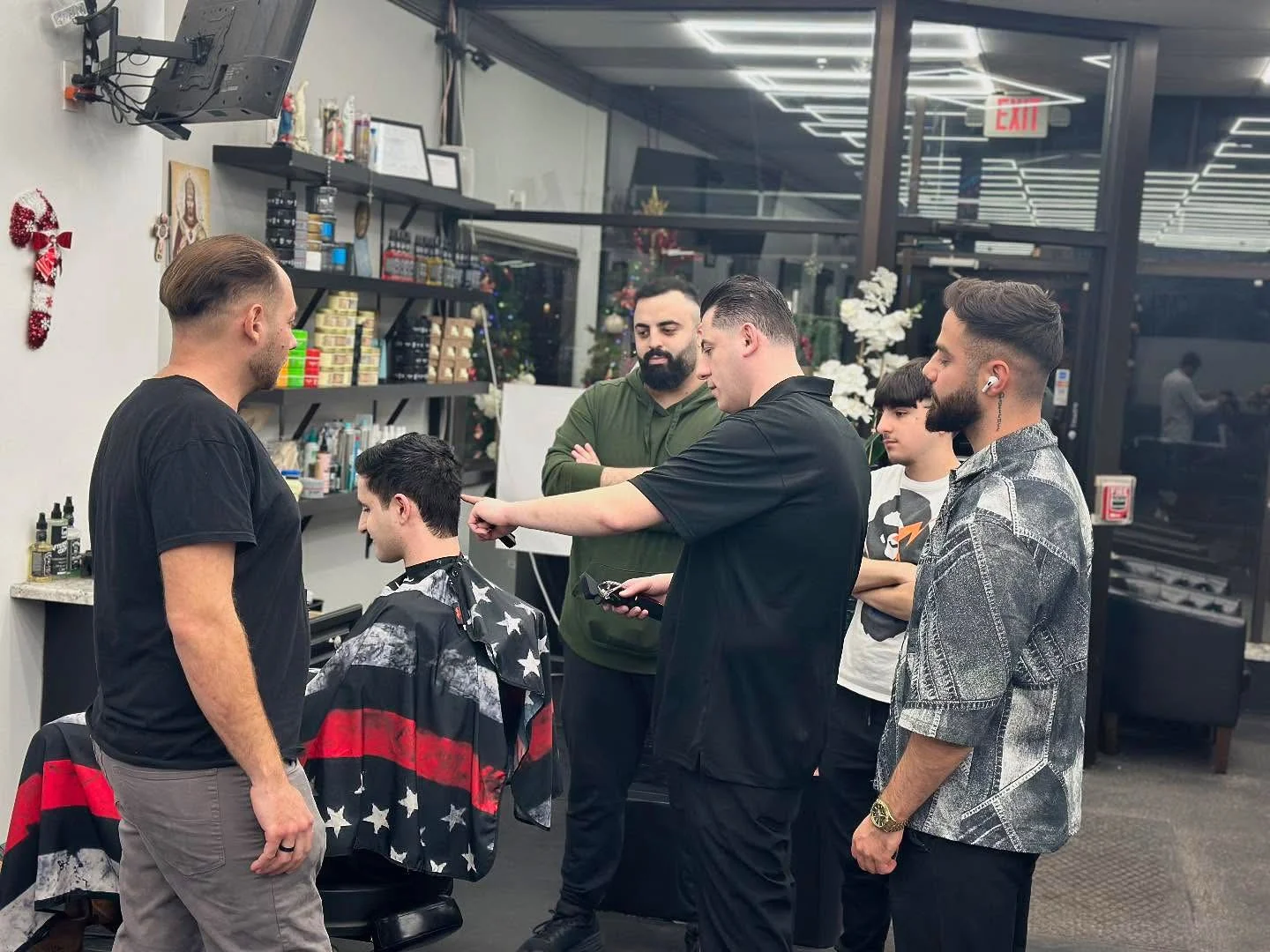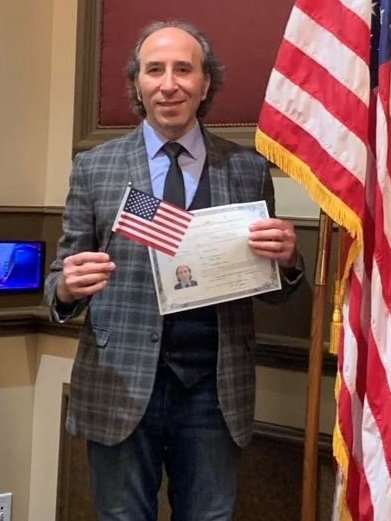Stories of Strength
Celebrating immigrant heritage month
By Sarah Kittle
Each June, Immigrant Heritage Month offers a time to recognize and celebrate the millions of immigrants who have shaped—and continue to enrich—the American story. It’s a moment to honor the diverse cultures, backgrounds, and journeys that define the soul of the United States. From first-generation newcomers to families with deep immigration roots, this month invites us to listen, learn, and amplify voices that are often unheard.
At its core, Immigrant Heritage Month is about storytelling—giving space to narratives of resilience, hope, and the pursuit of a better life. In that spirit, we share the journeys of two remarkable individuals: Sean Tela, a 32-year-old immigrant from Iraq, and Yasser Ashkar, a 54-year-old immigrant from Syria by way of Turkey.
Sean’s Story
Born in northern Iraq, Sean Tela spent his early childhood in the town of Telkaif. His father owned a pair of liquor stores and faced regular threats from members of the local Muslim community opposed to alcohol sales. Because of the danger, Sean was not allowed to work in the stores.
Instead, at age 11, he was apprenticed to a barber who lived across the street. Sean quickly fell in love with the trade. “I just wanted to work,” he said. That early experience sparked a lifelong passion for barbering.
LISTEN TO THIS STORY!
CN Audio Stories are made possible with generous support from the Chaldean American Chamber of Commerce
It wasn’t until Sean arrived in the United States that he felt truly alive. “My eyes opened up here,” he said. Though he spoke only Sureth and Arabic at the time, he embraced the culture, the land—everything about America. He enrolled at Walled Lake Central High School, took ESL classes, and quickly adapted.
Sean first landed in Chicago with his family, including his older brother Fadi and younger sister Vera, before connecting to Detroit. At Metro Airport, they were welcomed by extended family members who had already settled in the U.S.—his grandmother and aunts. It was a joyful reunion.
A turning point came when Sean connected with Salon Skye, a Chaldean-owned salon in West Bloomfield Township. “They helped me out so much,” he said, noting the support he received in building clientele and launching his own business—Sean’s Salon & Barbershop.
He opened his first location in West Bloomfield a decade ago. Since then, he’s expanded with shops in Walled Lake, Commerce, and most recently, Waterford. Now, Sean is focused on scaling his business and building a legacy. He recently launched a barber school—not only to train future employees, but to pass on his craft. “I want to teach the next generation how to cut hair,” he said.
Yasser’s Story
Yasser Ashkar was born in 1971 in Aleppo, Syria—one of the world’s oldest continuously inhabited cities.
“As a child, I was oblivious to Aleppo’s historical and cultural significance,” Yasser said. “It was simply my home. Life was full of family, tradition, and a strong sense of community.” Aleppo was renowned for its ethnic diversity, ancient souks, architecture, and cuisine.
But life under the Assad regime was repressive. “Even before the war, there were things you couldn’t say without risking your safety,” he said. “We were taught to stay quiet, avoid politics, and live under constant surveillance.”
When the Syrian revolution began in 2011, many saw it as a chance for long-awaited freedom. But the war that followed brought immense destruction and mass displacement. Aleppo became a symbol of suffering.
“Still, I carry the spirit of Aleppo with me,” Yasser said. “The resilience of its people, the richness of its culture, and the hope that one day it will rise again.”
His journey to America was both physical and emotional. “Leaving Syria meant saying goodbye to family, friends, and a lifetime of memories,” he said. “But it had become unlivable under dictatorship and war.”
Coming to the U.S. was not just about safety—it was about seeking a place to breathe freely and live with dignity. “The process was long, uncertain, and often painful,” he said. “There was grief in leaving, but also hope in arriving.”
“In America, I found opportunities I never had—especially the freedom to speak openly and connect with people from all walks of life,” he said. But the transition was not without challenges. He had to rebuild from scratch, learn new systems, and adapt to a new culture. The openness and generosity of many Americans helped him feel not just like he was starting over—but starting anew.
A few surprises stood out. Yasser was struck by how openly Americans express their opinions, especially toward political leaders. Coming from a country where dissent could be dangerous, it was shocking—and empowering—to see citizens protest and debate without fear.
He also noticed the cultural emphasis on individualism. “In Syria, life revolves around family and community. In America, there’s a focus on personal freedom and independence,” he said. “It can be empowering, but also isolating.”
Yasser hopes to offer his new community perspective, connection, and gratitude through action. “I want to be a bridge—someone who helps others see beyond borders and reminds people of our shared humanity,” he said. “Whether through writing, speaking, volunteering, or simply being present, I want to contribute to a culture of empathy, awareness, and justice.”
He is particularly passionate about human rights, democracy, and standing with the oppressed. “I know firsthand what it means to live without freedom,” he said.
The American?
Recently, reports emerged that the U.S. Department of Homeland Security is reviewing a pitch for a reality TV show titled The American. In the proposed series, pitched by Rob Worsoff (Duck Dynasty, Dating Naked) migrants would compete in American-themed challenges—such as pizza-making in New York or car assembly in Detroit—for a chance to fast-track citizenship.
While unapproved, the pilot has sparked debate around ethics, entertainment, and immigration policy. DHS confirmed it is one of hundreds of pitches currently under review.
Honoring Our Shared Story
For Sean and Yasser, the meaning of “home” has evolved. For Sean, it once meant a large house in Telkaif. Now, it’s his wife, children, and extended family. For Yasser, “home” used to be Aleppo—its streets, family meals, and memories. But after being forced to leave, he realized home isn’t always a place you can return to.
Today, home is defined more by people, values, and a sense of belonging. It’s where one can speak freely, live meaningfully, and be accepted. It’s a space to give and receive care.
“In many ways, America has become a new kind of home,” Yasser said. “A place of refuge, opportunity, and new beginnings. But Syria will always live in my heart—in my language, in my memories, and in my hopes for the future. Home is both a wound and a source of strength. It’s something I carry with me and continue to build every day.”
Immigrant Heritage Month is not just about where someone came from—it’s about what they bring to the American story. From business and innovation to art, education, and faith, immigrants have left an indelible mark on every corner of American life. This month invites all of us to reflect on those contributions—and to ask how we can be better neighbors, allies, and storytellers.



